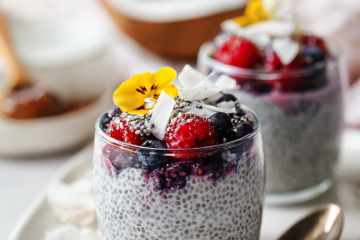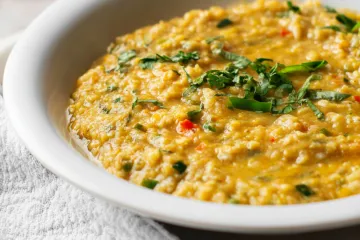Thai Peanut Chicken has become one of my go-to weeknight dinners. This dish combines tender chicken with a rich, creamy peanut sauce that delivers authentic Thai flavors. I love how this recipe transforms simple ingredients into something extraordinary. The combination of savory soy sauce and smooth peanut butter creates a sauce that’s both comforting and exotic.
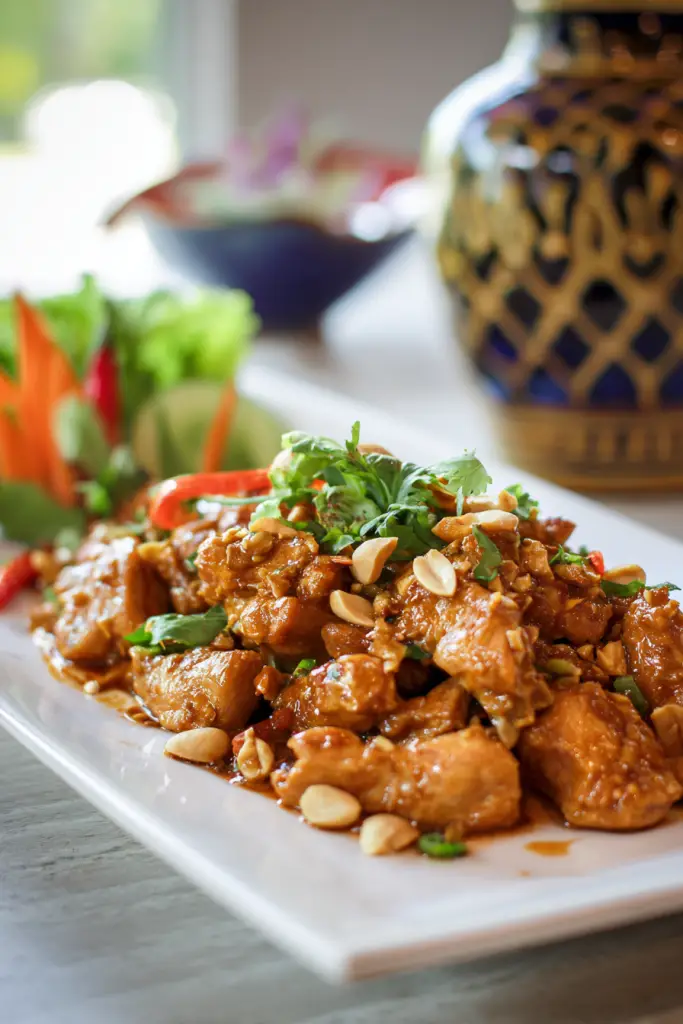
What makes this recipe special is its simplicity. In just 25 minutes, you can have a restaurant-quality meal on your table. The sauce comes together quickly, and the chicken cooks evenly every time. I’ve served this to guests who always ask for the recipe. The creamy coconut milk balances the saltiness perfectly, while fresh garlic adds depth to every bite.
This Thai Peanut Chicken works beautifully for busy families. The ingredients are pantry-friendly, and the cooking method is straightforward. I often double the recipe because leftovers taste even better the next day. Whether you’re new to Thai cooking or looking for a reliable weeknight option, this recipe delivers consistently delicious results.
Why You’ll Love This Thai Peanut Chicken
Quick and Satisfying: Ready in under 30 minutes with minimal prep work required for busy weeknights
Pantry-Friendly Ingredients: Uses common ingredients you likely already have in your kitchen
Crowd-Pleasing Flavor: Appeals to both adults and kids with its mild, creamy taste
Versatile Serving Options: Pairs perfectly with rice, noodles, or your favorite vegetables
Recipe Timing and Difficulty
Prep Time: 10 minutes | Cook Time: 15 minutes | Total Time: 25 minutes
Servings: 4 | Difficulty: Easy
Ingredients for Thai Peanut Chicken
Here’s everything you need to make this delicious dish:
| Ingredient | Quantity | Notes |
|---|---|---|
| Boneless, skinless chicken breasts | 4 (about 1.5 lbs) | Cut into bite-sized pieces |
| Fresh garlic | 2 cloves, minced | Fresh gives better flavor than powder |
| Low-sodium soy sauce | 1/4 cup | Controls saltiness better |
| Creamy natural peanut butter | 1/3 cup | Natural varieties work best |
| Full-fat coconut milk | 1/2 cup | Adds richness and creaminess |
| Salt and pepper | To taste | Season chicken generously |
| Vegetable oil | 1 tablespoon | For cooking the chicken |
I always use natural peanut butter for this recipe. The oils blend better with coconut milk than processed varieties. Fresh garlic makes a noticeable difference in flavor compared to garlic powder. Full-fat coconut milk creates the creamy texture that makes this sauce irresistible.
How to Make Thai Peanut Chicken
Follow these simple steps for perfect results every time:
Step 1: Prepare the Chicken
Cut your chicken breasts into uniform, bite-sized pieces. This ensures even cooking throughout. Season generously with salt and pepper on all sides. Let the seasoned chicken sit for 5 minutes while you prepare other ingredients.
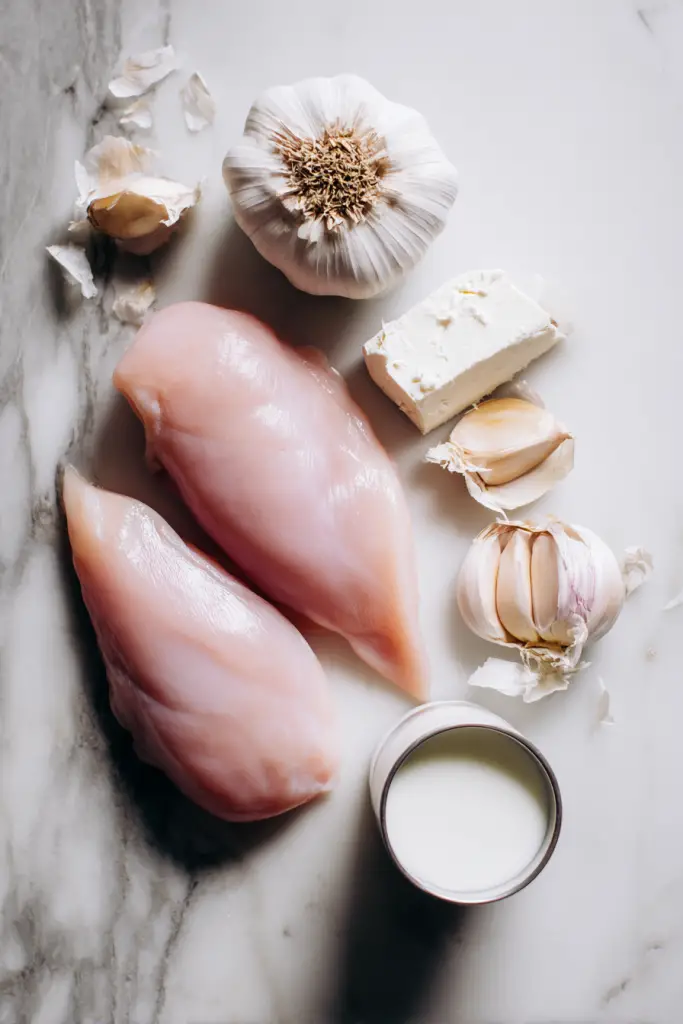
Step 2: Cook the Chicken
Heat vegetable oil in a large skillet over medium-high heat. Once the oil shimmers, add the chicken pieces in a single layer. Avoid overcrowding the pan, which can cause steaming instead of browning. Cook for 5-7 minutes, stirring occasionally, until golden brown and cooked through. The internal temperature should reach 165°F.
Remove the cooked chicken from the skillet and set aside on a plate. Don’t worry about any browned bits stuck to the pan – they’ll add flavor to your sauce.
Step 3: Make the Peanut Sauce
Reduce heat to medium and add minced garlic to the same skillet. Sauté for 30-60 seconds until fragrant but not browned. Garlic burns quickly, so watch it carefully.
Add the soy sauce first, scraping up any browned bits from the bottom of the pan. These bits add incredible depth to your sauce. Next, add the peanut butter and stir until it begins to melt and combine with the soy sauce.
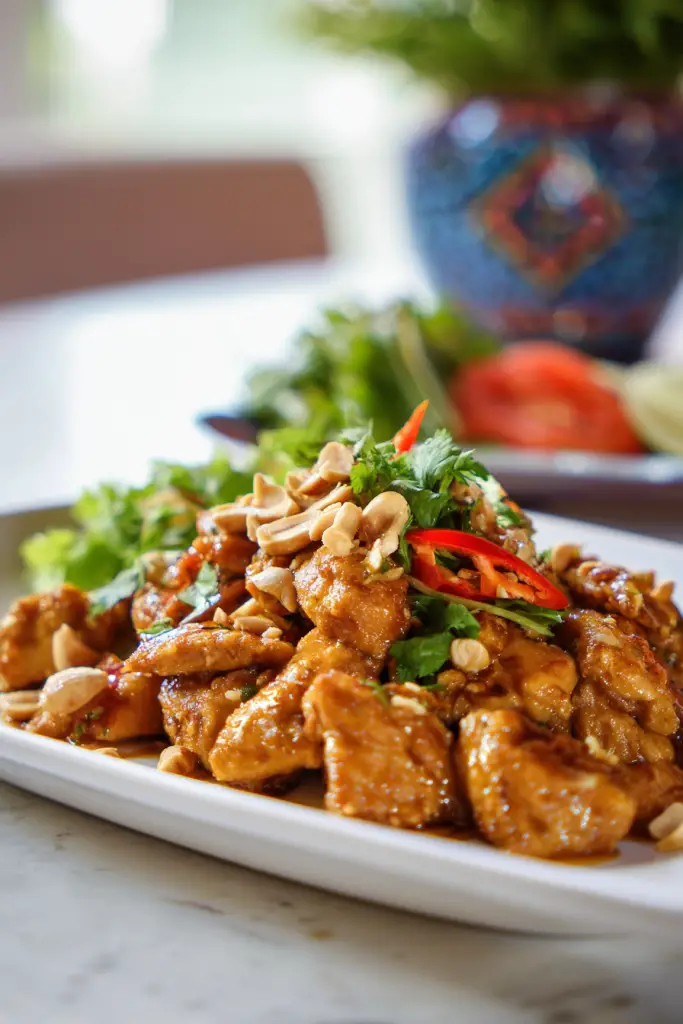
Slowly pour in the coconut milk while stirring constantly. The sauce will look separated at first, but keep stirring. It will come together into a smooth, creamy consistency within 2-3 minutes.
Step 4: Combine and Finish
Return the cooked chicken to the skillet with the sauce. Stir gently to coat every piece evenly with the creamy peanut sauce. Let everything simmer together for 2-3 minutes. This allows the chicken to absorb some of the sauce flavors.
Taste and adjust seasoning as needed. If the sauce seems too thick, add a tablespoon of water or more coconut milk. If it needs more saltiness, add a splash of soy sauce.
Step 5: Serve Immediately
Transfer to serving plates while hot. The sauce thickens as it cools, so serve promptly for the best texture. Garnish with chopped green onions, crushed peanuts, or fresh cilantro if desired.
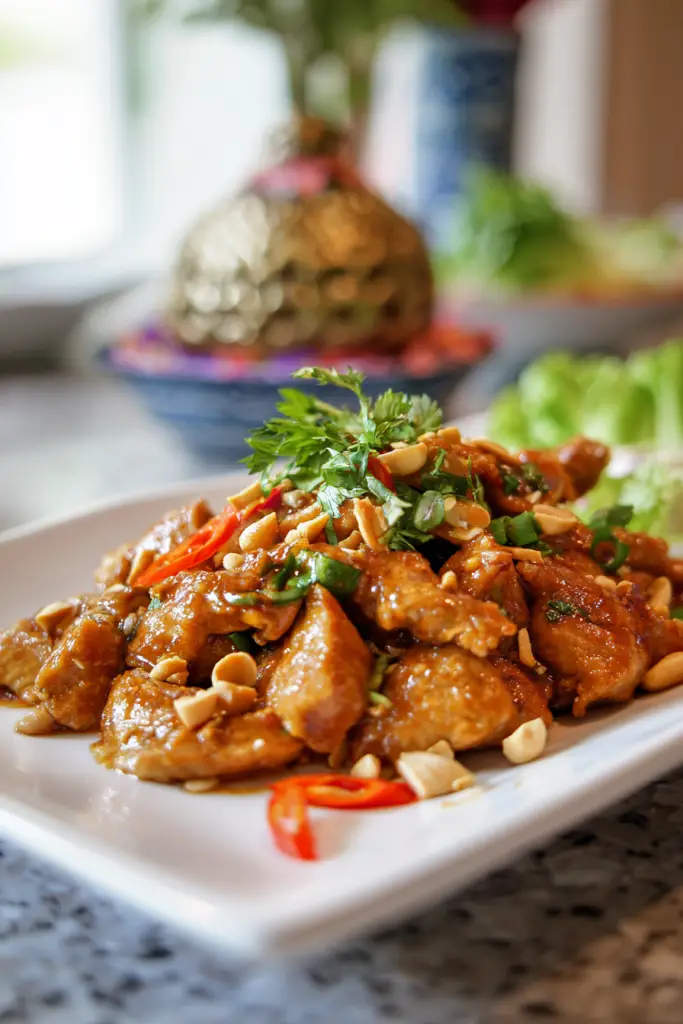
Tips and Serving Suggestions
Pro Tips for Perfect Thai Peanut Chicken
Don’t Skip the Browning: Taking time to properly brown the chicken creates deeper flavor throughout the dish. Those golden edges make a difference you can taste.
Stir Constantly When Adding Coconut Milk: This prevents the sauce from separating or curdling. A smooth sauce is worth the extra attention.
Room Temperature Ingredients: Let your coconut milk and peanut butter come to room temperature before cooking. They’ll combine more easily and create a smoother sauce.
Taste as You Go: Every brand of peanut butter and soy sauce varies in saltiness. Adjust seasonings gradually to suit your preferences.
How to Serve Thai Peanut Chicken
This versatile dish pairs beautifully with many sides:
Over Rice: Jasmine rice is traditional, but brown rice or cauliflower rice work well too
With Noodles: Rice noodles, lo mein, or even spaghetti make excellent bases
Alongside Vegetables: Steamed broccoli, snap peas, or stir-fried bell peppers complement the flavors
With Fresh Herbs: Chopped cilantro, Thai basil, or green onions add brightness and color
Make-Ahead and Storage Tips
Make-Ahead: You can prep the sauce components up to 2 days in advance. Store the mixed sauce in the refrigerator and gently reheat before adding cooked chicken.
Storing Leftovers: Keep leftovers in airtight containers for up to 4 days in the refrigerator. The sauce may thicken, but it reheats beautifully.
Reheating: Warm gently on the stovetop over medium-low heat, stirring occasionally. Add a splash of coconut milk or water if the sauce seems too thick.
Freezing: This dish freezes well for up to 3 months. Thaw overnight in the refrigerator before reheating.
Recipe Variations
Spice It Up: Add a pinch of red pepper flakes or a dash of sriracha to the sauce for heat
Vegetable Additions: Bell peppers, snap peas, or carrots can be added with the chicken for extra nutrition
Different Proteins: This sauce works equally well with shrimp, tofu, or thinly sliced beef
Crunchy Texture: Sprinkle chopped peanuts on top before serving for added crunch
Frequently Asked Questions
Can I use crunchy peanut butter instead? While creamy peanut butter creates the smoothest sauce, crunchy can work. The texture will be slightly different, but still delicious. You may need to stir more vigorously to incorporate it fully.
What if I don’t have coconut milk? Heavy cream makes a good substitute, though it will change the flavor profile slightly. Use the same amount and expect a richer, less tropical taste. For a lighter option, try half-and-half, but add it more slowly to prevent curdling.
How can I make this dish spicier? Add red pepper flakes, sriracha, or fresh sliced chilies to taste. Start with a small amount – you can always add more, but you can’t take it out. Thai bird’s eye chilies provide authentic heat if you can find them.
Is this recipe gluten-free? This recipe can be gluten-free if you use tamari instead of regular soy sauce. Check your peanut butter label too, as some brands contain gluten-containing ingredients. Most natural peanut butters are gluten-free.
Can I double this recipe? Absolutely! This recipe doubles perfectly. Use a larger skillet or work in batches if your pan isn’t big enough. The cooking times remain the same, but you may need an extra minute or two for the sauce to come together.
Final Thoughts
This Thai Peanut Chicken recipe has earned its place in my regular dinner rotation. The combination of simple ingredients and complex flavors never fails to impress. I love how quickly it comes together on busy evenings when I need something satisfying but don’t want to spend hours in the kitchen.
The creamy peanut sauce strikes the perfect balance between familiar comfort food and exotic flavors. It’s mild enough for children but sophisticated enough for dinner parties. Every time I make this dish, I’m reminded why Thai cuisine is so beloved worldwide.
Whether you’re exploring Thai flavors for the first time or looking for a reliable weeknight recipe, this Thai Peanut Chicken delivers. The ingredients are affordable and accessible, the technique is straightforward, and the results are consistently delicious. Give it a try – I think you’ll find it becomes one of your favorites too.
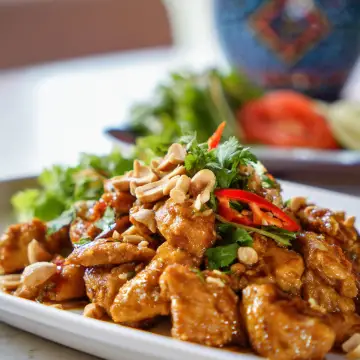
Thai Peanut Chicken
Ingredients
- 4 boneless skinless chicken breasts (about 1.5 lbs), cut into bite-sized pieces
- 2 cloves fresh garlic minced
- 1/4 cup low-sodium soy sauce
- 1/3 cup creamy natural peanut butter
- 1/2 cup full-fat coconut milk
- Salt and pepper to taste
- 1 tablespoon vegetable oil
Instructions
- Prepare the Chicken: Cut chicken breasts into uniform, bite-sized pieces. Season generously with salt and pepper on all sides. Let sit for 5 minutes.
- Cook the Chicken: Heat vegetable oil in a large skillet over medium-high heat. Add chicken pieces in a single layer, avoiding overcrowding. Cook for 5-7 minutes, stirring occasionally, until golden brown and cooked through (internal temperature 165°F). Remove chicken from skillet and set aside.
- Make the Peanut Sauce: Reduce heat to medium. Add minced garlic to the same skillet and sauté for 30-60 seconds until fragrant. Add soy sauce, scraping up browned bits from the pan. Stir in peanut butter until it begins to melt. Slowly pour in coconut milk while stirring constantly until sauce becomes smooth and creamy, about 2-3 minutes.
- Combine and Finish: Return cooked chicken to the skillet with the sauce. Stir to coat evenly. Simmer together for 2-3 minutes. Taste and adjust seasoning as needed.
- Serve: Transfer to serving plates while hot. Garnish with chopped green onions, crushed peanuts, or fresh cilantro if desired. Serve over rice or noodles.
Notes
Storage: Store leftovers in airtight containers for up to 4 days in the refrigerator
Reheating: Warm gently on stovetop over medium-low heat; add splash of coconut milk or water if sauce is too thick
Freezing: Freezes well for up to 3 months; thaw overnight in refrigerator before reheating
Spicy Version: Add red pepper flakes, sriracha, or Thai bird’s eye chilies to taste
Gluten-Free: Use tamari instead of regular soy sauce
Substitutions: Heavy cream can replace coconut milk (different flavor profile); shrimp, tofu, or beef can replace chicken











